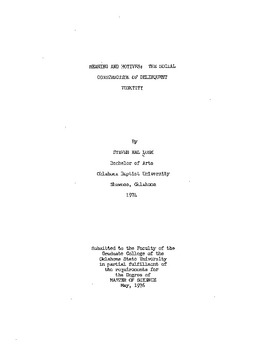| dc.contributor.advisor | Edgley, Charles | |
| dc.contributor.author | Lusk, Steven Hal | |
| dc.date.accessioned | 2015-10-14T21:37:31Z | |
| dc.date.available | 2015-10-14T21:37:31Z | |
| dc.date.issued | 1976-05-01 | |
| dc.identifier.uri | https://hdl.handle.net/11244/19609 | |
| dc.description.abstract | I assume that one of the most fundamental characteristics of humans and a social order is value commitment. I mean by this nothing more or less than the fact that a person who is capable of drawing or holding his breath would appear to be an individual with a value commitment., however strong or weak that commitment might be and however well or ill thought-out his decision might be. One might suppose that this statement would be well received amongst those who are committed to understanding something as unavoidably moral as "deviant behavior". Certainly it should be well received by those who are committed to such a morally laden enterprise as "helping" their fellow man. In fact, it does not seem to be well received by many in these circles. B.Y a curious twist, many researchers and others who claim either to expand our knowledge about people or to be "helping"people, freely commit themselves to certain values in a context in which values are not discussed. Whatever values they are committed to or will admit to, these are presumably not allowed to enter the decision making processes of their work. In this context, values are seen as the Pandora's box, which, if opened, may unleash the horrors of judgement. Visions of a crude Inquisition are conjured up and contrasted with a "scientific" or more "progressive" understanding which may lead to a more "humane" treatment of the "afflicted". The results are neither an increased understanding of people (the "phenomenon") nor humane treatment. Indeed, one understands much more about the researcher or the one "helping" than he does about the ones researched or "helped". The researcher's or helper's values remain thinly veiled and in the attempt to veil them he becomes committed to listening to himself rather than the people he seeks to understand or "help". Here, the concept of humanity becomes the equivalent of narcissism. | |
| dc.format | application/pdf | |
| dc.language | en_US | |
| dc.publisher | Oklahoma State University | |
| dc.rights | Copyright is held by the author who has granted the Oklahoma State University Library the non-exclusive right to share this material in its institutional repository. Contact Digital Library Services at lib-dls@okstate.edu or 405-744-9161 for the permission policy on the use, reproduction or distribution of this material. | |
| dc.title | Meaning and Motives: the Social Construction of Delinquent Identity | |
| dc.type | text | |
| dc.contributor.committeeMember | Allen, Donald E. | |
| dc.contributor.committeeMember | Bynum, Jack E. | |
| dc.contributor.committeeMember | Arquitt, George E., Jr. | |
| osu.filename | Thesis-1976-L971m.pdf | |
| osu.accesstype | Open Access | |
| dc.description.department | Sociology | |
| dc.type.genre | Thesis | |
